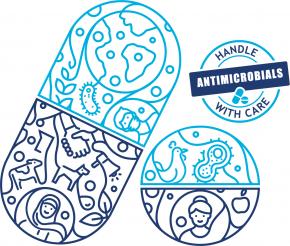- The Foundation
- Aims
- Research Activities
- News
- FOUNDATIONCONTACT
- SCIENTIFIC ACTIVITYPublications
- Studies
- Score Calculators
 18–24 November is World Antimicrobial Awareness Week (WAAW) and we are celebrating by highlighting the work of EF CLIF researchers who contribute efforts to tackle antimicrobial resistance in patients with liver disease
18–24 November is World Antimicrobial Awareness Week (WAAW) and we are celebrating by highlighting the work of EF CLIF researchers who contribute efforts to tackle antimicrobial resistance in patients with liver disease
BARCELONA—Multidrug-resistant bacterial infections constitute an increasing healthcare problem that negatively impacts survival of patients with liver disease. Strategies to prevent the spread of antimicrobial resistance in liver disease, particularly decompensated cirrhosis and acute-on-chronic liver failure (ACLF), should be urgently addressed.
Researchers at EF CLIF have contributed to the wealth of evidence that infections caused by bacteria resistant to main antibiotic families are prevalent in patients with decompensated cirrhosis and ACLF. Fernandez et al. (2019) conducted a prospective investigation in a series of patients from the CANONIC study hospitalized with decompensated cirrhosis in 2011 and another series of patients was investigated in 2017–2018 across Europe. Within the first series of patients, most frequent infections included spontaneous bacterial peritonitis, urinary tract infections and pneumonia. Episodes of nosocomial infections (i.e., infections acquired during hospitalization) were predominant in this series of patients. Extended-spectrum beta-lactamase-producing Enterobacteriaceae were the most frequent multidrug-resistant bacteria isolated in these patients, whereas in patients from the second series the researchers observed an increase in carbapenem-resistant Enterobacteriaceae. Noteworthy, the prevalence and type of resitant bacteria differed greatly among countries and centers.
More recently, researchers at EF CLIF in collaboration with Hospital Clinic de Barcelona (Spain), Centre Hospitalier de Luxembourg (Luxembourg), Goethe University Frankfurt (Germany), University Hospital Frankfurt (Germany) and University Center of Competence for Infection Control (Germany), reported that rectal colonization by multidrug-resistant bacteria is prevalent in cirrhosis and poses a high risk of infection for critically ill cirrhotic patients. Targeted antibiotic therapies and rapid isolation of multidrug-resistant bacteria carriers may contribute to reduce the spread of antibiotic resistance among cirrhotic patients that require critical care.
Together these findings suggest that epidemiological surveillance may help to minimize the risk of severe bacterial infections in hospitalized patients with cirrhosis and decreasing the spectrum of the empirical antimicrobial regime in the intensive care unit patient are strategies that can prevent antimicrobial resistance.
Publication information
Fernández, J., Prado, V., Trebicka, J., Amoros, A., Gustot, T., Wiest, R., Deulofeu, C., Garcia, E., Acevedo, J., Fuhrmann, V., Durand, F., Sánchez, C., Papp, M., Caraceni, P., Vargas, V., Bañares, R., Piano, S., Janicko, M., Albillos, A., Alessandria, C., Soriano, G., Welzel, T.M., Laleman, W., Gerbes, A., De Gottardi, A., Merli, M., Coenraad, M., Saliba, F., Pavesi, M., Jalan, R., Ginès, P., Angeli, P., Arroyo, V.; European Foundation for the Study of Chronic Liver Failure (EF CLIF). Multidrug-resistant bacterial infections in patients with decompensated cirrhosis and with acute-on-chronic liver failure in Europe. J. Hepatol. 2019, 70: 398–411. DOI: 10.1016/j.jhep.2018.10.027
Prado, V., Hernández-Tejero, M., Mücke, M. M., Marco, F., Gu, W., Amoros, A., Toapanta, D., Reverter, E., de la Peña-Ramirez, C., Altenpeter, L., Bassegoda, O., Mezzano, G., Aziz, F., Juanola, A., Rodríguez-Tajes, S., Chamorro, V., López, D., Reyes, M., Hogardt, M., Kempf, V. A. J., Ferstl, P. G., Zeuzem, S., Martínez, J. A., Vila, J., Arroyo, V., Trebicka, J., Fernandez, J. Rectal colonization by resistant bacteria increases the risk of infection by the colonizing strain in critically ill patients with cirrhosis. J. Hepatol. 2022, 76: P1079–1089. DOI: 10.1016/j.jhep.2021.12.042